人教版(2019)选择性必修 第二册Unit 4 Journey Across a Vast Land Workbook Xu Xiake's Guilin 课文注释版课件(22张ppt)
文档属性
| 名称 | 人教版(2019)选择性必修 第二册Unit 4 Journey Across a Vast Land Workbook Xu Xiake's Guilin 课文注释版课件(22张ppt) |  | |
| 格式 | pptx | ||
| 文件大小 | 11.7MB | ||
| 资源类型 | 教案 | ||
| 版本资源 | 人教版(2019) | ||
| 科目 | 英语 | ||
| 更新时间 | 2022-12-29 21:13:06 | ||
图片预览



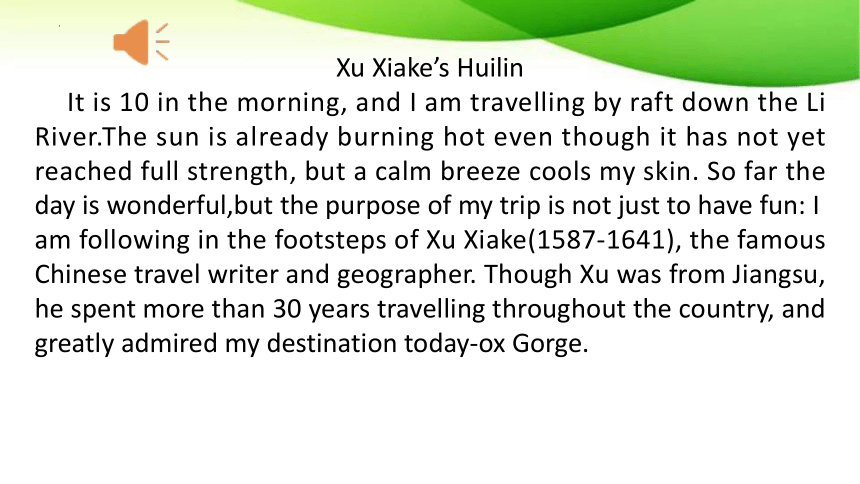
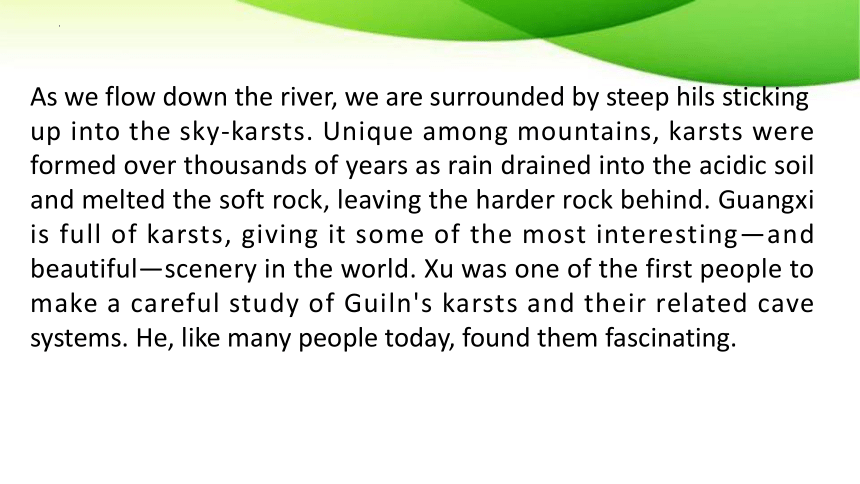
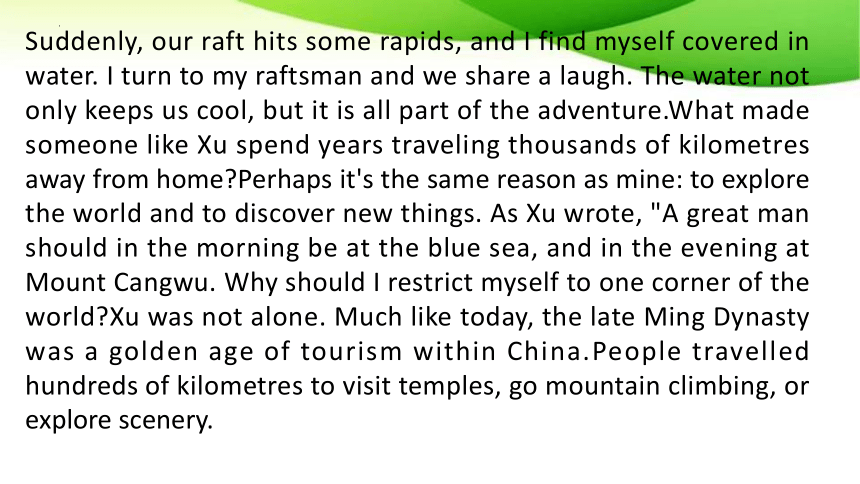
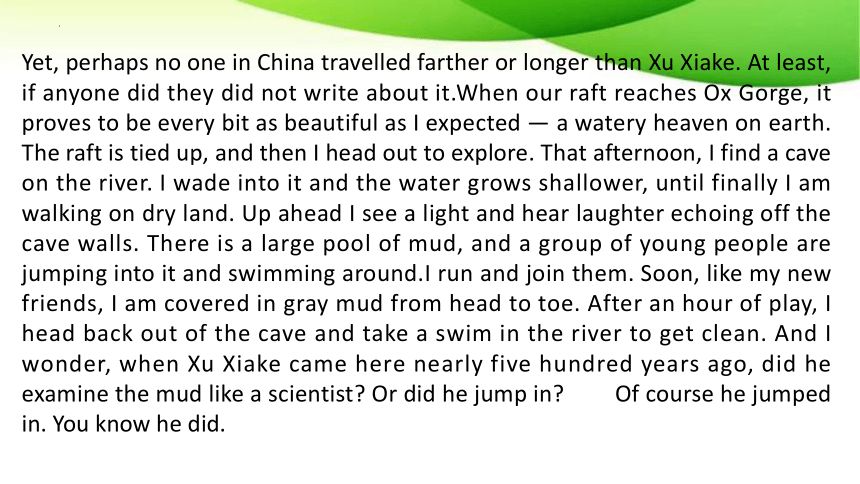
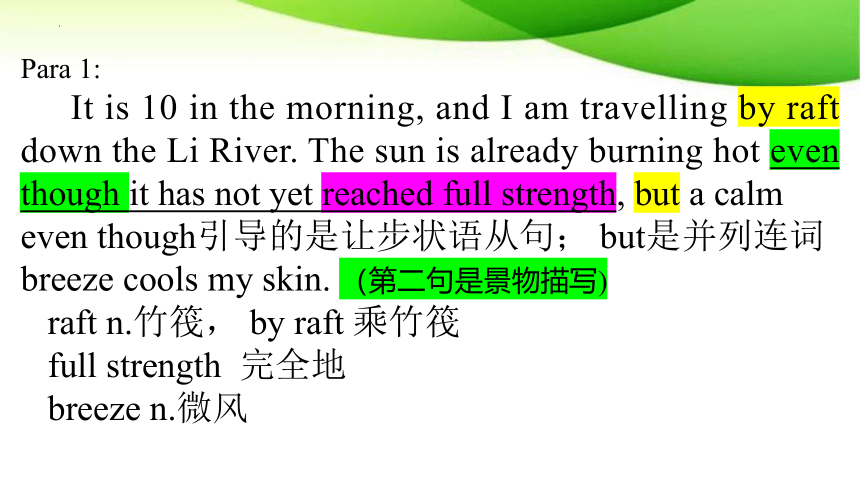
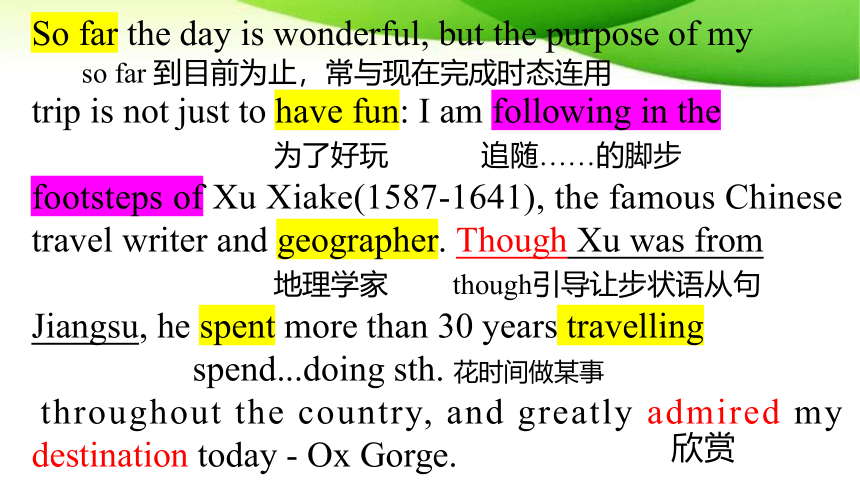
文档简介
(共22张PPT)
高中人教英语选择性必修二 Unit 4 workbook
Xu Xiake’s Guilin
徐霞客简介
第一部分 课文录音与注释
Xu Xiake’s Huilin
It is 10 in the morning, and I am travelling by raft down the Li River.The sun is already burning hot even though it has not yet reached full strength, but a calm breeze cools my skin. So far the day is wonderful,but the purpose of my trip is not just to have fun: I am following in the footsteps of Xu Xiake(1587-1641), the famous Chinese travel writer and geographer. Though Xu was from Jiangsu, he spent more than 30 years travelling throughout the country, and greatly admired my destination today-ox Gorge.
As we flow down the river, we are surrounded by steep hils sticking up into the sky-karsts. Unique among mountains, karsts were formed over thousands of years as rain drained into the acidic soil and melted the soft rock, leaving the harder rock behind. Guangxi is full of karsts, giving it some of the most interesting—and beautiful—scenery in the world. Xu was one of the first people to make a careful study of Guiln's karsts and their related cave systems. He, like many people today, found them fascinating.
Suddenly, our raft hits some rapids, and I find myself covered in water. I turn to my raftsman and we share a laugh. The water not only keeps us cool, but it is all part of the adventure.What made someone like Xu spend years traveling thousands of kilometres away from home Perhaps it's the same reason as mine: to explore the world and to discover new things. As Xu wrote, "A great man should in the morning be at the blue sea, and in the evening at Mount Cangwu. Why should I restrict myself to one corner of the world Xu was not alone. Much like today, the late Ming Dynasty was a golden age of tourism within China.People travelled hundreds of kilometres to visit temples, go mountain climbing, or explore scenery.
Yet, perhaps no one in China travelled farther or longer than Xu Xiake. At least, if anyone did they did not write about it.When our raft reaches Ox Gorge, it proves to be every bit as beautiful as I expected — a watery heaven on earth. The raft is tied up, and then I head out to explore. That afternoon, I find a cave on the river. I wade into it and the water grows shallower, until finally I am walking on dry land. Up ahead I see a light and hear laughter echoing off the cave walls. There is a large pool of mud, and a group of young people are jumping into it and swimming around.I run and join them. Soon, like my new friends, I am covered in gray mud from head to toe. After an hour of play, I head back out of the cave and take a swim in the river to get clean. And I wonder, when Xu Xiake came here nearly five hundred years ago, did he examine the mud like a scientist Or did he jump in Of course he jumped in. You know he did.
Para 1:
It is 10 in the morning, and I am travelling by raft down the Li River. The sun is already burning hot even though it has not yet reached full strength, but a calm
even though引导的是让步状语从句; but是并列连词
breeze cools my skin. (第二句是景物描写)
raft n.竹筏, by raft 乘竹筏
full strength 完全地
breeze n.微风
So far the day is wonderful, but the purpose of my
so far 到目前为止,常与现在完成时态连用
trip is not just to have fun: I am following in the
为了好玩 追随……的脚步
footsteps of Xu Xiake(1587-1641), the famous Chinese travel writer and geographer. Though Xu was from
地理学家 though引导让步状语从句
Jiangsu, he spent more than 30 years travelling
spend...doing sth. 花时间做某事
throughout the country, and greatly admired my destination today - Ox Gorge.
欣赏
Para 2:
As we flow down the river, we are surrounded by
as 引导的时间状语从句; 被……包围着
steep hills sticking up into the sky — karsts. Unique
陡峭的, 直插云霄 喀斯特
among mountains, karsts were formed over thousands
形成
of years as rain drained into the acidic soil and melted
滴 酸性的 融化
the soft rock, leaving the harder rock behind.
现在分词短语作结果状语
Guangxi is full of karsts, giving it some of the most
满是 现在分词短语作结果状语
interesting — and beautiful — scenery in the world. Xu was one of the first people to make a careful study
认真研究
of Guilin's karsts and their related cave systems. He,
相关的
like many people today, found them fascinating.
动词+宾语+宾补
Para3:
Suddenly, our raft hits some rapids, and I find
撞上 激流
myself covered in water. I turn to my raftsman
find sb. done 发现某人被 求助于
and we share a laugh. The water not only keeps
一起哈哈大笑
us cool, but it is all part of the adventure.
not only...but(also)... 不仅……而且……
Para4: What made someone like Xu spend years travelling thousands of kilometres away from home Perhaps it's the same reason as mine: to explore the world
和 ……一样
and to discover new things. As Xu wrote, “A great man
as引导的定语从句
should in the morning be at the blue sea, and in the evening at Mount Cangwu. Why should I restrict
restrict...to...把……限制在……
myself to one corner of the world ”
Para 5:
Xu was not alone. Much like today, the late Ming Dynasty was a golden age of tourism within China. People travelled hundreds of
旅游业
kilometres to visit temples, go mountain climbing, or explore scenery.
三个不定式并列作目的状语
Yet, perhaps no one in China travelled farther or longer
far的 比较级
than Xu Xiake. At least, if anyone did they did not write about it.
至少 条件状语从句
Para6:
When our raft reaches Ox Gorge, it proves to be every bit
时间状语从句 证明
as beautiful as I expected — a watery heaven on earth. The
as...as...像……一样…… 第二个as引导的比较状语从句
raft is tied up, and then I head out to explore. That afternoon,
栓上 出去
I find a cave on the river. I wade into it and the water grows
蹚水走进去
shallower, until finally I am walking on dry land.
时间状语从句
Up ahead I see a light and hear laughter echoing off the
hear sb./sth. doing 听到某人或某物正在 echo off 发出回声
cave walls. There is a large pool of mud, and a group of
there be句型
young people are jumping into it and swimming around.
现在进行时
I run and join them. Soon, like my new friends, I am covered
be covered in 满身是
in gray mud from head to toe. After an hour of play, I head
从头到脚
back out of the cave and take a swim in the river to get clean.
head back out of 退出去 游泳
And I wonder, [when Xu Xiake came here nearly five hundred
时间状语从句
years ago, did he examine the mud like a scientist Or did he jump in ]
Of course he jumped in. You know he did.
中括号内为wonder的宾语
第二部分 课文主旨与理解
一、Reading comprehension:
1. What’ s the main idea of the passage
It’s about the author’s _______________.
2.Why did the author decided to go to Guilin
He wanted to __________________________
travel to Guilin
follow in the footsteps of Xu Xiake.
4. Why did Xu XiaKe like to travel
________________________________________________________________________________________
as rain drained into the acidic soil and metled the soft rock.
3. How are karsts formed
They are formed over thousands of years ________________________________________________________________________________________
To explore the world and discover new things
5. What did the author do in the cave
He joined a group of young people for playing in mud.
6. What difficulties did Xu Xiake probably face
The long distance, the unconvenient transport, the money and so on.
Thinking:
What can we learn from Xu Xiake
We can learn from his love for nature, his longing for knowledge, and his spirits of never giving up.
高中人教英语选择性必修二 Unit 4 workbook
Xu Xiake’s Guilin
徐霞客简介
第一部分 课文录音与注释
Xu Xiake’s Huilin
It is 10 in the morning, and I am travelling by raft down the Li River.The sun is already burning hot even though it has not yet reached full strength, but a calm breeze cools my skin. So far the day is wonderful,but the purpose of my trip is not just to have fun: I am following in the footsteps of Xu Xiake(1587-1641), the famous Chinese travel writer and geographer. Though Xu was from Jiangsu, he spent more than 30 years travelling throughout the country, and greatly admired my destination today-ox Gorge.
As we flow down the river, we are surrounded by steep hils sticking up into the sky-karsts. Unique among mountains, karsts were formed over thousands of years as rain drained into the acidic soil and melted the soft rock, leaving the harder rock behind. Guangxi is full of karsts, giving it some of the most interesting—and beautiful—scenery in the world. Xu was one of the first people to make a careful study of Guiln's karsts and their related cave systems. He, like many people today, found them fascinating.
Suddenly, our raft hits some rapids, and I find myself covered in water. I turn to my raftsman and we share a laugh. The water not only keeps us cool, but it is all part of the adventure.What made someone like Xu spend years traveling thousands of kilometres away from home Perhaps it's the same reason as mine: to explore the world and to discover new things. As Xu wrote, "A great man should in the morning be at the blue sea, and in the evening at Mount Cangwu. Why should I restrict myself to one corner of the world Xu was not alone. Much like today, the late Ming Dynasty was a golden age of tourism within China.People travelled hundreds of kilometres to visit temples, go mountain climbing, or explore scenery.
Yet, perhaps no one in China travelled farther or longer than Xu Xiake. At least, if anyone did they did not write about it.When our raft reaches Ox Gorge, it proves to be every bit as beautiful as I expected — a watery heaven on earth. The raft is tied up, and then I head out to explore. That afternoon, I find a cave on the river. I wade into it and the water grows shallower, until finally I am walking on dry land. Up ahead I see a light and hear laughter echoing off the cave walls. There is a large pool of mud, and a group of young people are jumping into it and swimming around.I run and join them. Soon, like my new friends, I am covered in gray mud from head to toe. After an hour of play, I head back out of the cave and take a swim in the river to get clean. And I wonder, when Xu Xiake came here nearly five hundred years ago, did he examine the mud like a scientist Or did he jump in Of course he jumped in. You know he did.
Para 1:
It is 10 in the morning, and I am travelling by raft down the Li River. The sun is already burning hot even though it has not yet reached full strength, but a calm
even though引导的是让步状语从句; but是并列连词
breeze cools my skin. (第二句是景物描写)
raft n.竹筏, by raft 乘竹筏
full strength 完全地
breeze n.微风
So far the day is wonderful, but the purpose of my
so far 到目前为止,常与现在完成时态连用
trip is not just to have fun: I am following in the
为了好玩 追随……的脚步
footsteps of Xu Xiake(1587-1641), the famous Chinese travel writer and geographer. Though Xu was from
地理学家 though引导让步状语从句
Jiangsu, he spent more than 30 years travelling
spend...doing sth. 花时间做某事
throughout the country, and greatly admired my destination today - Ox Gorge.
欣赏
Para 2:
As we flow down the river, we are surrounded by
as 引导的时间状语从句; 被……包围着
steep hills sticking up into the sky — karsts. Unique
陡峭的, 直插云霄 喀斯特
among mountains, karsts were formed over thousands
形成
of years as rain drained into the acidic soil and melted
滴 酸性的 融化
the soft rock, leaving the harder rock behind.
现在分词短语作结果状语
Guangxi is full of karsts, giving it some of the most
满是 现在分词短语作结果状语
interesting — and beautiful — scenery in the world. Xu was one of the first people to make a careful study
认真研究
of Guilin's karsts and their related cave systems. He,
相关的
like many people today, found them fascinating.
动词+宾语+宾补
Para3:
Suddenly, our raft hits some rapids, and I find
撞上 激流
myself covered in water. I turn to my raftsman
find sb. done 发现某人被 求助于
and we share a laugh. The water not only keeps
一起哈哈大笑
us cool, but it is all part of the adventure.
not only...but(also)... 不仅……而且……
Para4: What made someone like Xu spend years travelling thousands of kilometres away from home Perhaps it's the same reason as mine: to explore the world
和 ……一样
and to discover new things. As Xu wrote, “A great man
as引导的定语从句
should in the morning be at the blue sea, and in the evening at Mount Cangwu. Why should I restrict
restrict...to...把……限制在……
myself to one corner of the world ”
Para 5:
Xu was not alone. Much like today, the late Ming Dynasty was a golden age of tourism within China. People travelled hundreds of
旅游业
kilometres to visit temples, go mountain climbing, or explore scenery.
三个不定式并列作目的状语
Yet, perhaps no one in China travelled farther or longer
far的 比较级
than Xu Xiake. At least, if anyone did they did not write about it.
至少 条件状语从句
Para6:
When our raft reaches Ox Gorge, it proves to be every bit
时间状语从句 证明
as beautiful as I expected — a watery heaven on earth. The
as...as...像……一样…… 第二个as引导的比较状语从句
raft is tied up, and then I head out to explore. That afternoon,
栓上 出去
I find a cave on the river. I wade into it and the water grows
蹚水走进去
shallower, until finally I am walking on dry land.
时间状语从句
Up ahead I see a light and hear laughter echoing off the
hear sb./sth. doing 听到某人或某物正在 echo off 发出回声
cave walls. There is a large pool of mud, and a group of
there be句型
young people are jumping into it and swimming around.
现在进行时
I run and join them. Soon, like my new friends, I am covered
be covered in 满身是
in gray mud from head to toe. After an hour of play, I head
从头到脚
back out of the cave and take a swim in the river to get clean.
head back out of 退出去 游泳
And I wonder, [when Xu Xiake came here nearly five hundred
时间状语从句
years ago, did he examine the mud like a scientist Or did he jump in ]
Of course he jumped in. You know he did.
中括号内为wonder的宾语
第二部分 课文主旨与理解
一、Reading comprehension:
1. What’ s the main idea of the passage
It’s about the author’s _______________.
2.Why did the author decided to go to Guilin
He wanted to __________________________
travel to Guilin
follow in the footsteps of Xu Xiake.
4. Why did Xu XiaKe like to travel
________________________________________________________________________________________
as rain drained into the acidic soil and metled the soft rock.
3. How are karsts formed
They are formed over thousands of years ________________________________________________________________________________________
To explore the world and discover new things
5. What did the author do in the cave
He joined a group of young people for playing in mud.
6. What difficulties did Xu Xiake probably face
The long distance, the unconvenient transport, the money and so on.
Thinking:
What can we learn from Xu Xiake
We can learn from his love for nature, his longing for knowledge, and his spirits of never giving up.
